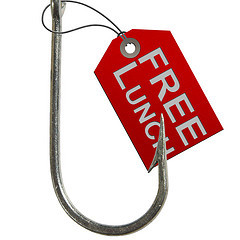 Recently I had the opportunity to review a company’s website and some of their affiliations that they had with particular companies. My natural tendency is to look at what companies the firm recommended when it came to financial advising and investing.
Recently I had the opportunity to review a company’s website and some of their affiliations that they had with particular companies. My natural tendency is to look at what companies the firm recommended when it came to financial advising and investing.
As I was perusing through the list of providers my eyes came across a rather intriguing headline that was given by one of the “preferred” vendors. The headline read, “Free Financial Plan – Over $1,000 Value!” Some of you may be wondering the same thing I was wondering: “Who in their right mind would give away $1,000?” Instantly I knew there was a catch. After doing a bit more research I found out that this “preferred” provider’s strategy was to simply create a “financial plan” that was geared toward having the clients invest and put money in financial products that paid high commissions.
The take away from the article is its title. There’s no free lunch. If something looks too good to be true it usually is. In the glaring example above, who could afford to give away $1,000 of their product or services consistently? Needless to say, this business is doing very well, so you know they’re getting that $1,000 (and more) elsewhere.
A few questions to ask when someone offers a free service or advice, especially when it comes to your finances are these:
- What are the long term costs of this investment?
- If this service is free, where do you make your money?
- Why is this free?
- What’s in it for you?
- Since it’s free, will I be assured the same value as if I were paying you?
- And my favorite: What are you selling?
Granted, not all free services are bad or require this much scrutiny. Routinely, Jim and I will sit down with potential clients during our get acquainted session and use this hour or so as a time for us to get to know our potential clients and for them to get to know us. This is something we don’t charge for. And our clients are grateful that they can get to know us without being charged for it.
Other businesses do the same. Like the free quote for insurance, estimates for repairs, etc. The main point is that professionals don’t exchange their value for free. It doesn’t mean that there can’t be pro bono work done nor does it mean that a product or service can be occasionally provided gratis.
What it does mean is that if someone is willing to give away a product or service of significant value, generally it means that there’s a catch – and you’re the fish.



 Sterling Raskie, MSFS, CFP®, ChFC®
Sterling Raskie, MSFS, CFP®, ChFC® The latest in our Owner’s Manual series, A 401(k) Owner’s Manual, was published in January 2020 and is available on
The latest in our Owner’s Manual series, A 401(k) Owner’s Manual, was published in January 2020 and is available on  A Medicare Owner’s Manual, is updated with 2020 facts and figures. This manual is available on
A Medicare Owner’s Manual, is updated with 2020 facts and figures. This manual is available on  Social Security for the Suddenly Single can be found on Amazon at
Social Security for the Suddenly Single can be found on Amazon at  Sterling’s first book, Lose Weight Save Money, can be
Sterling’s first book, Lose Weight Save Money, can be  An IRA Owner’s Manual, 2nd Edition is available for purchase on Amazon. Click the link to choose the
An IRA Owner’s Manual, 2nd Edition is available for purchase on Amazon. Click the link to choose the  Jim’s book – A Social Security Owner’s Manual, is now available on Amazon. Click this link for the
Jim’s book – A Social Security Owner’s Manual, is now available on Amazon. Click this link for the  And if you’ve come here to learn about queuing waterfowl, I apologize for the confusion. You may want to discuss your question with Lester, my loyal watchduck and self-proclaimed “advisor’s advisor”.
And if you’ve come here to learn about queuing waterfowl, I apologize for the confusion. You may want to discuss your question with Lester, my loyal watchduck and self-proclaimed “advisor’s advisor”.
A good article to read thanks; I agree with you; a minor example:
I got some gift cards to Home Depot (in exchange for helping a home repair guy
I didn’t really want the cards so I set about to selling them. I had $150 card to sell. I wanted atleast $100. So I found a website buying gift cards. They quoted: I could get a check for $127. I thought to myself; how could the company make any money ??? if they pay such high prices for cards? so i researched the company.
Turns out the company has been cited for “stealing cards !! @@@
so as you say; there is no free lunch or “beware of free lunches!! thanks ! anne/ conn.
Diversification is the only free lunch.
The real question is if this client, who obviously is pushing products that have high costs to its customers, still on your “Preferred Vendor” list???
That’s a great question! This firm was on the preferred vendor list of another company, not ours. Thanks for the comment!
sr
Thanks. That wasn’t clear to me in your post.